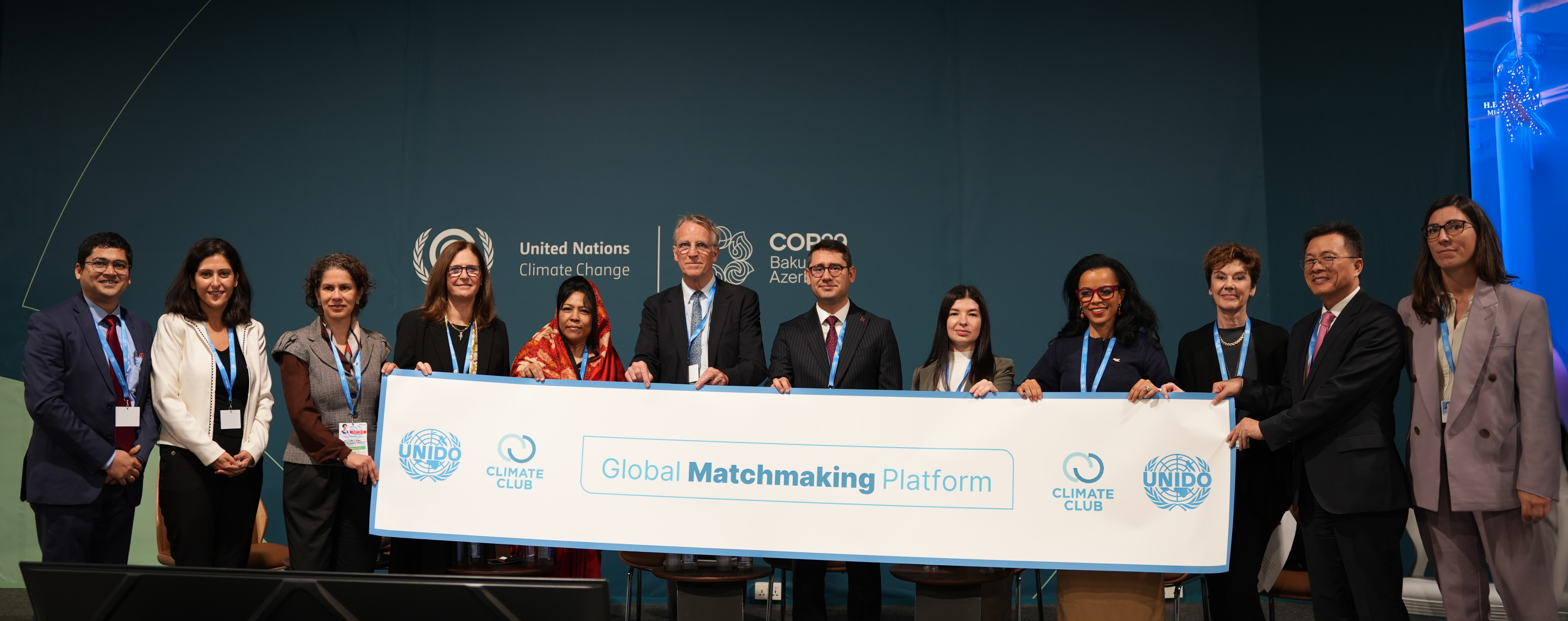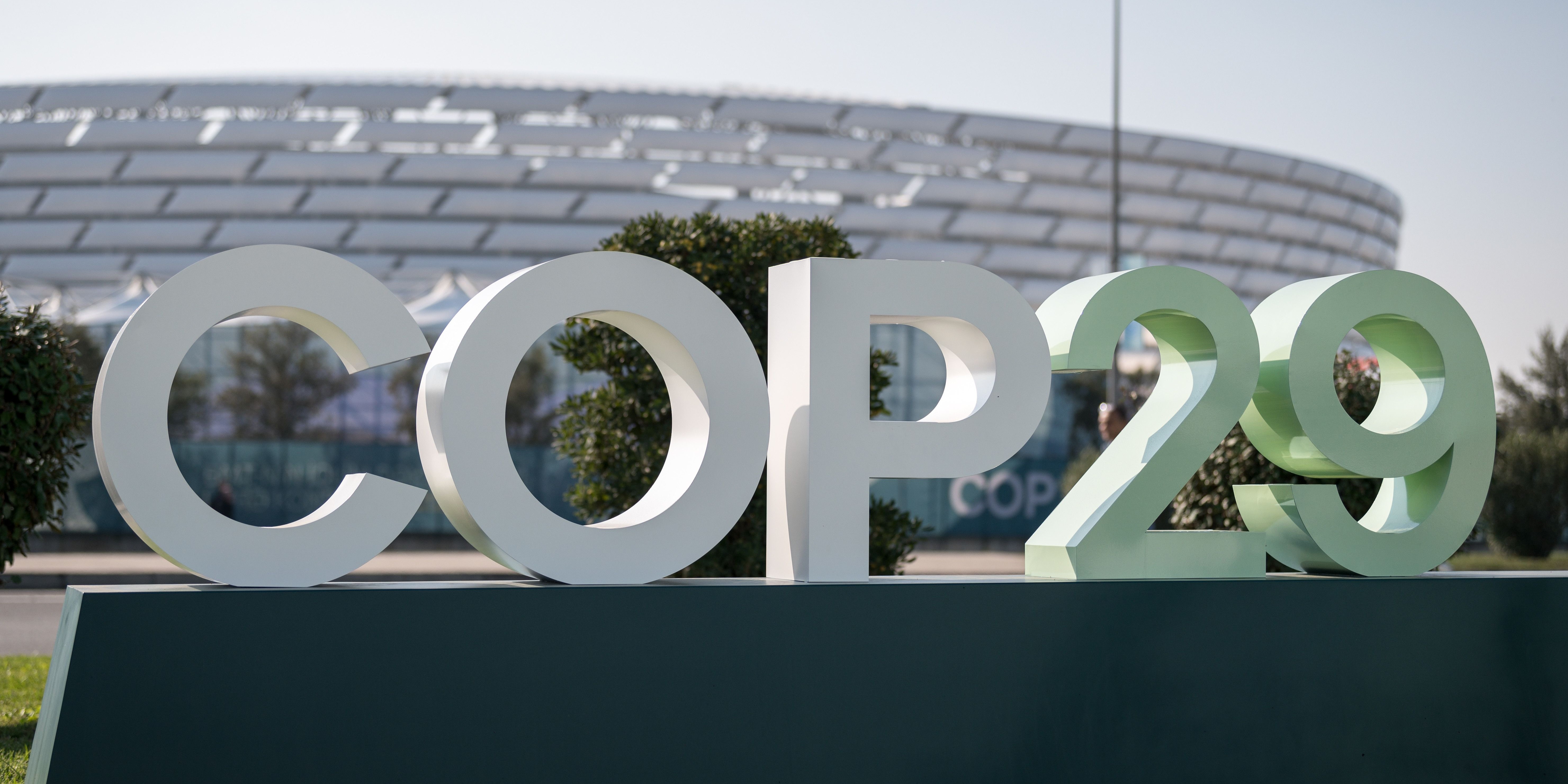

UNIDO at COP29: Industrial Solutions for People and Planet
04 December 2024

Baku, November 24 - Cutting industrial greenhouse gas emissions is vital to achieving the 1.5°C target of the Paris Agreement, and sustainable industry is a critical part of the solution to the climate crisis. This was UNIDO’s message at the United Nations Climate Change Conference (COP29) held in Baku, Azerbaijan, from 11-24 November, 2024.
"Driving innovation and green industrial transformation in emerging economies is key to building a sustainable future. At COP29, we have demonstrated that collaborative solutions, cutting-edge technologies, and strategic partnerships can accelerate our transition to a low-emission, climate-resilient world,” said Ciyong Zou, Deputy to the Director-General and Managing Director of the Directorate of Technical Cooperation and Sustainable Industrial Development, who headed the UNIDO delegation at COP29.
The UNIDO Climate Change Strategy, recently adopted by the Industrial Development Board, provided the overarching framework for the Organization’s engagements in Baku. “Egypt is proud to have played the key role in the elaboration and adoption of this strategy, which fully aligns with our vision of sustainable industrial development in harmony with environmental stewardship. Developed through a transparent and collaborative process, this strategy provides a pathway to increase the efficiency and impact of UNIDO’s climate actions, benefiting both people and the planet,” said Ambassador Mohamed Ibrahim Nasr, Permanent Representative of Egypt to the United Nations in Vienna.
This year, the Organization took a significant step forward by hosting the first-ever UNIDO pavilion at COP, with over 45 events showcasing innovative climate solutions, ranging from just energy transition, clean cooking solutions, sustainable cities and transport to innovative adaptation technologies and the empowerment of women and youth.
Under the COP29 Presidency Climate Action Agenda, UNIDO supported three transformative energy initiatives. These pledges, signed by more than 50 governments and other stakeholders, target deploying 1500 gigawatts of energy storage by 2030, refurbishing 80 million kilometres of power grid infrastructure by 2040, and transitioning to low-carbon and renewable hydrogen alternatives.
The productive collaboration between the Technology Executive Committee under the United Framework Convention on Climate Change and UNIDO culminated in the joint organisation of the Technology Day on Transformative Industry, offering a platform for industry leaders, technology providers, experts, innovators, investors, and policymakers to share technology options and demonstrate viable policies, regulations, and other approaches for the decarbonization of hard-to-abate industries.
Among the most significant announcements was the launch of the Global Matchmaking Platform under the Climate Club. Funding for this platform will be part of a larger, $1.3 billion pledge from Germany, the United Kingdom, Canada, and the Climate Investment Funds to advance decarbonization in heavy-emitting industries in developing countries. “Promoting the green energy transition is a key priority for the COP29 Presidency and the Global Matchmaking Platform will play an important role in helping us to meet our collective climate goals,” said COP29 President Mukhtar Babayev.

In collaboration with Azerbaijan, UNIDO launched a new Center for Renewable Energy and Energy Efficiency for the Economic Cooperation Organization region. The center will promote renewable energy, energy efficiency, and green energy corridors, driving regional cooperation and capacity-building among its members.
By highlighting innovations such as AI-driven small hydro-power optimization and the revival of pumped storage, UNIDO underscored hydro-power’s indispensable role as a stabilizer for electricity grids and a vital resource for community resilience which serves as both a battery and a water reserve, particularly in isolated rural areas with mini-grids.
UNIDO convened key partners of the Global Programme for Hydrogen in Industry, with discussions including the International Hydrogen Trade Forum and the Brazil-UK Hydrogen Hub, whose secretariats are coordinated by UNIDO, as well as new initiatives such as the Global Clean Hydrogen Programme and the China Green Hydrogen Project. A joint event with Mitsubishi Heavy Industries focuses on de-risking investments in hydrogen technologies, with the aim of accelerating industrial decarbonization while generating social and economic benefits for developing countries and economies in transition.
Emphasizing the paramount importance of engaging the private sector in adaptation to climate impacts, the Organization launched the Climate Adaptation Innovation Learning, and partnered with four winners of Challenge Programme for Adaptation Innovation, funded by the Global Environment Facility (GEF). “The GEF is proud of our growing partnership with UNIDO on climate change, and especially on engagement of the private sector in climate adaptation and resilience. Awesome challenges call for awesome innovation, and industry is increasingly realizing the implications of the climate crisis and the unavoidable opportunities associated with it. Through a growing set of projects funded by GEF and implemented by UNIDO, industries, including financial institutions, and micro, small and medium enterprises, are catalyzing new financing, deploying innovative technologies, and increasing the scale of action to address the climate crisis,” said Jason Spensley, GEF Senior Climate Change Specialist.
A series of strategic dialogues highlighted the unique role micro-, small-, and medium-sized enterprises (MSMSs) play in driving locally-led innovation for climate adaptation and climate-resilient livelihoods and value chains, particularly in least developed countries. UNIDO also showcased the potential of adaptation MSMEs in leveraging private sector investments to address the adaptation finance gap.
As part of COP29 participation, UNIDO released a new toolbox designed to support developing countries in setting up industry-specific targets in their nationally determined contributions, due for submission in February 2025. Moreover, the latest TEC-UNIDO policy brief provided actionable guidance to integrate hard-to-abate industries into national climate targets. Three market assessment reports under the Accelerate-to-Demonstrate Facility focused on smart energy, industrial decarbonization, clean hydrogen, and critical minerals.
UNIDO also organized a series of dialogues aimed at ensuring women and youth can equally lead, benefit from, and contribute to sustainable industrial transformation. In collaboration with the Gender and Energy Compact and the Least Developed Countries Group on Climate Change, the Organization explored pathways for women to become transformative agents of change. The joint event with Women in Green Hydrogen and the Hydrogen Council examined the evolving role of women in the emerging hydrogen sector.
As the world confronts the urgent challenge of climate change, UNIDO stands at the forefront, demonstrating that industrial transformation is not just a necessity, but an opportunity for creating a more sustainable, resilient, and equitable future. The Organization's multifaceted outreach at COP29 sends a powerful message: meaningful climate action requires innovation, collaboration, and a commitment to comprehensive, inclusive solutions.
For additional information, please contact:
Alla Metelitsa